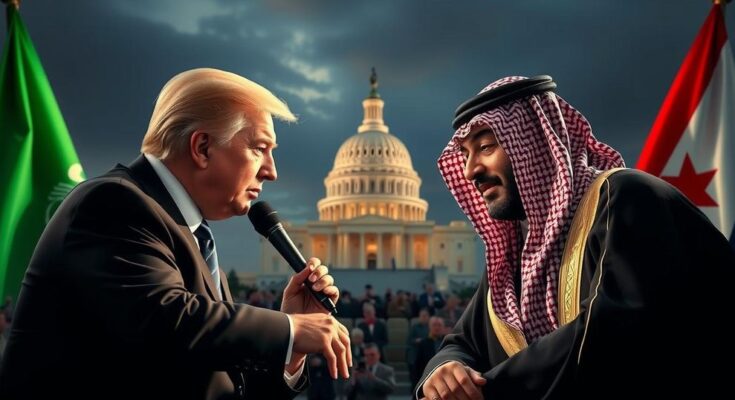Yahya Sinwar’s killing by Israeli forces has ignited U.S. lawmakers to push for a comprehensive geopolitical strategy linking Israeli security and Palestinian governance. Major proposals suggest that Gulf states like Saudi Arabia will play a role in reconstructing Gaza, potentially undermining Palestinian self-determination. This development highlights the intricate interplay between military actions and diplomatic objectives in a fraught humanitarian context.
The recent killing of Yahya Sinwar, the prominent leader of Hamas, has ignited a profound shift in the geopolitical landscape regarding Palestine and its governance. Sinwar was significantly implicated in orchestrating the October 7 attacks and had become a principal target for Israel. Reports indicate that he was injured by Israeli tank fire while exposed in a damaged building, an incident captured by military drones. Following his death, U.S. lawmakers from across the political spectrum seized upon this event as an opportunity to advance a broader policy agenda concerning the region. Notably, Senator Richard Blumenthal expressed optimism for regional progress, suggesting that Sinwar’s demise creates a pivotal moment for enhancing Israel’s security and fostering peace through normalized relations within the region. He stated, “The moment must be seized.” However, this statement hints at a more extensive proposal for a political restructuring that could lead to the establishment of a U.S.-Gulf cooperative regime in Gaza, potentially compromising Palestinian autonomy. Senator Lindsey Graham elaborated on his vision for a future Palestinian state, indicating that it would be less about sovereignty and more akin to an emirate supported by regional powers such as Saudi Arabia and the UAE. He remarked, “It will be more like an emirate than it will be a democracy,” suggesting a significant alteration of governance in the area, while simultaneously acknowledging a need for guarantees that prevent future violence against Israel. Despite Democratic leaders like Representative Adam Schiff calling for a cessation of hostilities in Gaza, many remain more focused on the strategic implications of Sinwar’s assassination. Congressional leaders have emphasized the necessity for a comprehensive approach that ties the reconstruction of Gaza to the overarching U.S. strategy in the Middle East, minimizing Palestinian input and self-determination in post-conflict plans. This interplay of military action and diplomatic maneuvering connects to President Biden’s ongoing efforts to secure a deal with Saudi Arabia, which he views as pivotal to his administration’s legacy. Amidst chaos and violence, the dialogue continues, reaffirming the United States’ commitment to align its interests with those of Gulf allies, despite the humanitarian crises resulting from these conflicts.
The article recounts the killing of Yahya Sinwar, a leader of Hamas who played a critical role in the October 7 attacks on Israel. His death has provoked discussions among U.S. officials and lawmakers, who see an opportunity to reshape the political landscape in Palestine, leveraging the situation to deepen ties with Saudi Arabia and the Gulf states. This has raised concerns about the future of Palestinian governance and self-determination, as proposed solutions appear primarily focused on American and Israeli interests rather than empowering the Palestinian people. The intricate dynamics of U.S. foreign policy, regional alliances, and the implications for the geopolitical climate shape the context of this unfolding narrative.
The assassination of Yahya Sinwar has catalyzed a series of discussions regarding the future governance of Gaza and Palestine, with U.S. lawmakers utilizing this event to promote a geopolitical realignment favoring Saudi Arabian influence. While some advocate for peace and stability, a significant discourse is emerging around the potential marginalization of Palestinian aspirations. The evolving strategies underscore the complexity of international relations in the region, particularly given the intertwining of U.S. interests with those of its Middle Eastern allies, amid ongoing humanitarian concerns.
Original Source: theintercept.com




